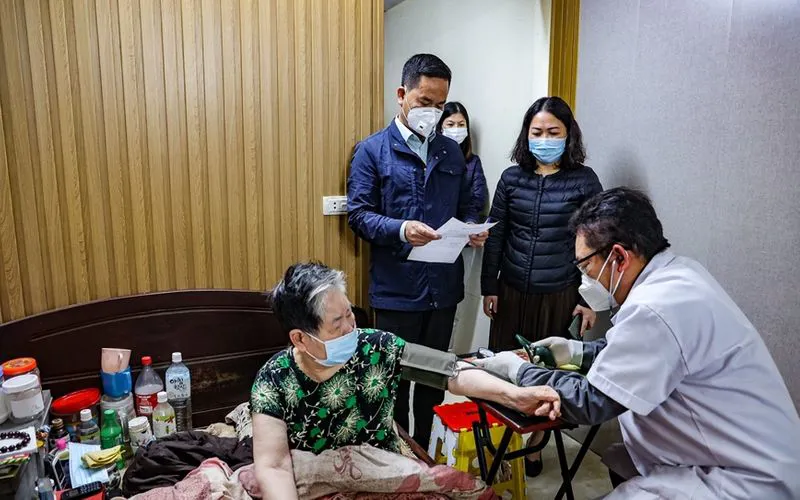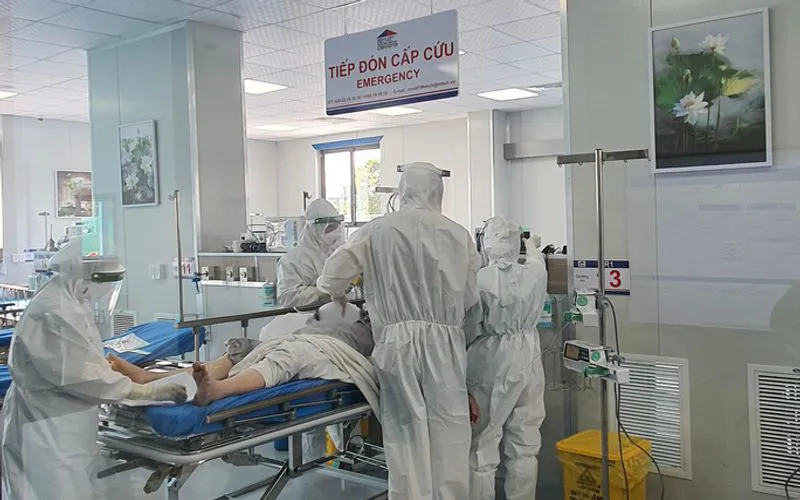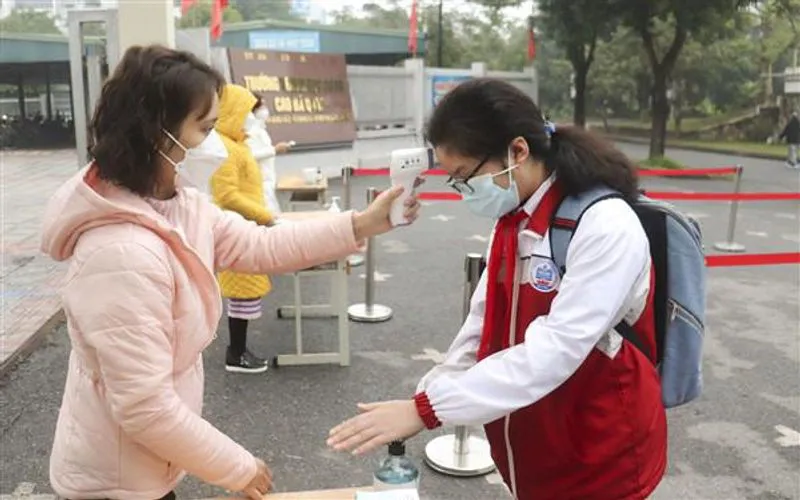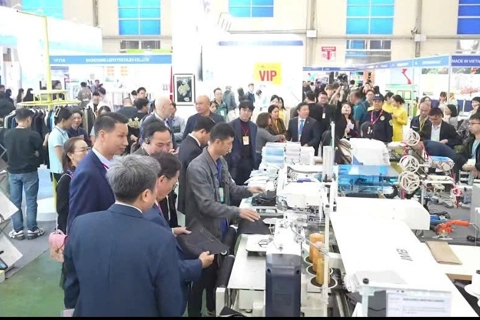Hanoi speeds up Covid-19 vaccination for all high-risk citizens
The Hanoi mayor has requested local administrations speed up the injection of additional booster shots for vulnerable people.
The Hanoi government is requesting all districts to collect records of local residents at high risk of contracting Covid-19 and give them vaccine booster shots as soon as possible, according to a recent notice signed by Chairman of the municipal People’s Committee Chu Ngoc Anh.
The move has been taken as caseload in the capital city remains high, with nearly 3,000 infections per day, the highest in the country. Besides, it aims to reduce hospitalization and death rates.
An old woman in Hanoi receives the Coivd-19 vaccine at home. Photo: Tuan Son |
Local administrations have been asked to urge high-risk and vaccine-hesitant people to complete the two-dose vaccination and ramp up at-home inoculations for homebound people who are aged above 50 with underlying health conditions, or at a high risk of severe illness from Covid-19, especially those who have not been inoculated, partially vaccinated, or refused vaccination, the notice said.
The Hanoi mayor has also requested the local administrations to speed up the injection of additional booster shots for vulnerable people and those living with these people as part of the Government's “Spring vaccination drive” from January 29 to February 28.
Chairpersons of the district-level people’s committees must be held accountable if any high-risk citizens go unvaccinated against Covid-19, the notice noted.
Over 99 % of the people aged over 12 in Hanoi have been double dosed and nearly 55% have received the booster shot.
Over 79.2 million of the country’s 98 million people have received at least one injection while above 74.7 million have been jabbed twice. Vietnam has set a target to complete the inoculation of additional and booster doses in the first quarter of 2022.
Vietnam’s Ministry of Health (MoH) has asked localities, especially the capital city of Hanoi, to raise the alert level and take appropriate measures to cope with the surge in the number of Covid-19 cases following the Lunar New Year (Tet) holiday.
On February 14, Vietnam saw a record high of nearly 29,500 cases in a single day. The newest cases, including 10 imported and 29,403 community cases, were found in all 63 provinces and cities, the health ministry said.
The capital city of Hanoi recorded the largest number of local cases with more than 3,500.
Treating Covid-19 patients at a field hospital in Hoang Mai District, Hanoi. Photo: Ngoc Tu |
According to the MoH, cases will continue to rise in the time ahead as students begin to go back to school and socio-economic activities return to normal. Therefore, it has asked other ministries and localities to be on higher alert, especially regarding the Omicron variant.
The ministry also urged localities and hospitals to step up the spring vaccination campaign to ensure that people at high risks are fully inoculated. It stated that mobile vaccination sites should be set up at factories, industrial parks, schools and local cultural centers so as to immunize as many people as possible at the same time.
After the government approved the plan to buy vaccines for children aged 5 to 12, the Ministry of Health is working to ensure that vaccination for children is conducted in a safe manner in line with scientific guidelines.
Minister Nguyen Thanh Long cited an assessment of the World Health Organization that the pandemic will not be fully controlled until 2023. As such, pandemic prevention remains a top priority for Vietnam.
Deputy Prime Minister Vu Duc Dam has asked the MoH to urgently issue guidelines on Covid-19 treatment protocols for people under 18 years old, especially children under 12.
A student of Cao Ba Quat Secondary School in Hanoi outskirt district of Gia Lam has hẻ body temperatures checked before entering the school. Photo: Hoang Quyet |
He requested the ministry to immediately train hospitals across the country to minimize the possibility of SARS-CoV-2 infection in the pediatric wards and avoid an overload of patients.
The MoH, the Ministry of Information and Communications, agencies and localities must also strengthen communication to get the cooperation of families, parents, and teachers in ensuring safety for children.
In an interview with The Hanoi Times via phone, Nguyen Trong Khoa, deputy director of the Department of Medical Examination and Treatment under the MoH, said that although the overall risk of children becoming severely ill or dying from Covid-19 is extremely low, children with Covid-19 are also at risk of developing long-term symptoms.
“According to an MoH's report, the death rate for Vietnamese under 17 who are infected is about 0.34% (about 130 children) of the total number of coronavirus-related deaths in Vietnam.
The rate of severe illness after convalescence from Covid-19 in this group is also very low,” Khoa cited the report, adding that even children who develop mild initial symptoms or are asymptomatic, would not be spared these long-lasting effects.
“In some cases, the disease in children becomes worse and requires mechanical ventilation, dialysis, and long-term treatment after being negative for coronavirus for two or three weeks afterward,” Khoa added.
He noted that to promptly detect post-Covid-19 symptoms in children, families need to closely monitor them, even two or three months after their convalescence, and take them to the doctor if they have any serious physical or mental concerns about their kids.














